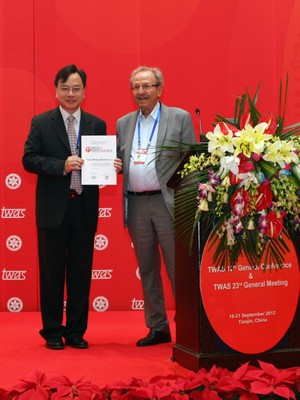Prize winner envisions China's science future
- By He Shan
 0 Comment(s)
0 Comment(s) Print
Print E-mail China.org.cn, September 21, 2012
E-mail China.org.cn, September 21, 2012
Yuk Ming Dennis Lo, winner of a US$100,000 prize reserved for scientists from the developing world, said at the TWAS 23rd General Meeting that it will take about 20 years for China to become a leader in science and technology.
 |
|
Lo received the Ernesto Illy Trieste Science Prize at the TWAS meeting. |
Professor Lo supported his guarded optimism with a slew of facts: China overtook Japan over the last decade to become the world's second-largest spender on R&D, and China is already second only to the United States in volume of scientific papers published, and a growing number of talented Chinese scientists who lived and worked abroad are returning home.
"Many of China's scientific institutions outperform those in the United States with generous government support," Lo told reporters at the conference, being held in Tianjin this week.
Lo is director of the Li Ka Shing Institute of Health Sciences and professor of medicine at the Chinese University of Hong Kong (CUHK), and has feels strongly that his country is moving faster than any other in the world to build a broader and more comprehensive science base.
But he went on to point that some problems still remain in China's science industry, adding that although the number of patents has risen sharply in the Chinese science sector, the quality of the patents still leaves much to be desired.
He also mentioned that flaws in China's patent law have become impediments to creating a research climate that allows scientists to succeed.
To make his case, he said: "My field is diagnosing technology. Under current Chinese law, for instance, the patents of new diagnostic equipment and devices are protected, but a new type of diagnosis is not protected."
When comparing to the Chinese mainland, Lo mentioned that Hong Kong still lags behind in R&D investment, with less than 1 percent of GDP spent on R&D.
At this TWAS meeting, Lo received the Ernesto Illy Trieste Science Prize, worth US$100,000, for creating a ground-breaking technology for scanning the entire genome of a fetus from a simple blood sample obtained from the pregnant mother. He is the first Chinese citizen to win the prestigious award.





